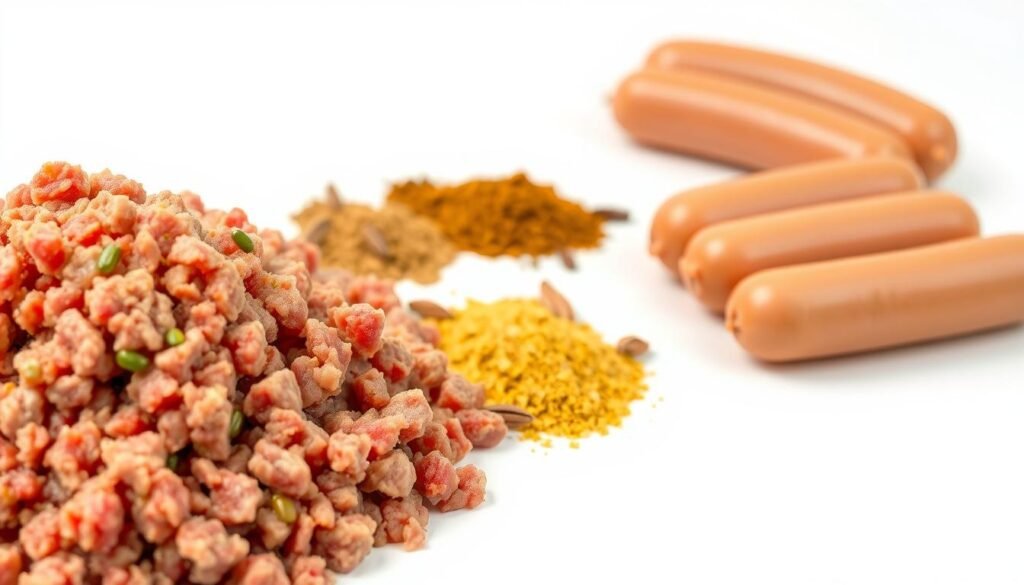While shopping in Seattle, I often wonder: Can Muslims eat hot dogs? It’s not just about taste. It’s a daily challenge for many to balance tradition and modern life. Searching for halal-certified options can be tough. But each package tells a story of faith, culture, and food choices.
Halal is more than just “allowed” or “forbidden” foods. It’s a system of care. The Quran guides us to treat animals well, feed them cleanly, and slaughter them with respect. But when hot dogs might have pork or unclear additives, it’s a tough choice.
Recently, 20 students from Sri Lanka, India, and other countries studied halal standards together. Their debates show global tensions. For example, Malaysia ruled that “bak kut teh” must change its name to get certified. Even the term “hot dog” causes confusion, as Jakim noted from Muslim tourists’ complaints.
Plant-based foods are okay unless they harm, the Islamic perspective says. So, why the fuss over substitutes that look like pork?
The plant-based market is growing fast, expected to hit $8.3 billion by 2025. Brands are under the microscope. Impossible Meat’s disputed halal certification for a pork-flavored product? The EU’s push for clear labeling? These are big debates about integrity in food.
As we explore these issues, let’s ask: How do we mix innovation with timeless principles guiding Muslims and hot dogs?
Understanding Islamic Dietary Laws
Islamic food laws guide over 1.8 billion Muslims every day. Halal means what is allowed, and haram means what is forbidden. These rules protect both body and soul.
“Prohibited to you are dead animals, blood, the flesh of swine, and that on which hath been invoked the name of other than Allah.” (Quran 5:3)”
The Concept of Halal in Islam
Halal is more than food. It’s about eating right and living ethically. Meat must be halal, meaning it’s slaughtered the right way.
This ensures it meets Islamic standards. The global halal market is expected to reach $2.6 trillion by 2025.
What Makes Food Haram (Forbidden)
Forbidden foods include pork, alcohol, and dead animals. Even tiny amounts of these can make food haram. For example, many hot dogs have hidden pork.
This makes it important to know what’s in our food. The Quran tells us to avoid these items for purity.
Importance of Halal in Muslim Faith
Dietary laws in Islam are not random. They make us think about our food choices. Every meal is a chance to worship.
Over 90% of Muslims look for halal products. This shows how important halal is for their culture. It also keeps them healthy by avoiding bad foods.
For Muslims, food rules connect their faith to daily life. As more people learn about it, understanding these rules becomes key.
Hot Dog Ingredients: A Closer Look
Traditional hot dogs mix meat trimmings with fillers like water and starch. This mix raises questions about their halal status. 
Traditional Hot Dog Composition
Hot dogs often use pork, beef, or poultry. Brands like Midamar mix species, but pork is most common. Halal-certified options from Midamar use poultry or beef, but must avoid contamination.
The USDA says 100% Halal products exist. But most hot dogs include pork additives.
Meat Sources and Processing Methods
Meat is ground with water and emulsifiers in hot dog making. This process raises halal concerns. Zabihah standards require humane treatment of animals.
But U.S. facilities often stun animals before slaughter. This is a topic of debate. Vegan casings offer a pork-free alternative.
Common Additives and Fillers
Additives like sodium nitrite or gelatin need careful review. Preservatives like carmine or L-cysteine might not be halal. Even spices must be traceable.
Certified brands like Midamar ensure no hidden pork. Questions remain about preservatives like sodium erythorbate. Halal audits check every ingredient, including casings. Choosing certified brands ensures purity.
Can Muslims Eat Hot Dogs? The Core Concerns
When we ask are hot dogs halal, it’s all about how they’re made. Halal hot dogs must follow Islamic rules, not just use halal meat. Beef or chicken hot dogs need to be slaughtered the right way, called zabihah.
Many brands, like Saffron Road, offer halal hot dogs. But, most big brands don’t tell us how they’re made.
Another big worry is cross-contamination. If hot dogs touch pork, they become haram. This is a big problem in places like Vermont, where many towns don’t have halal food.
Even halal meat costs more, making it hard for people to buy. This makes many Muslims choose not to eat hot dogs.
How people handle this varies. Some travel to Boston for halal food, while others use campus services like UVM’s halal chicken. But, without clear labels, many stay away from hot dogs. As more people want halal options, the market might grow. But, we need to know how food is made to make good choices.
Pork-Based Hot Dogs and Islamic Prohibitions

Thepork prohibition in Islamcomes from the Quran. Surah Al-An’am 6:145 says pork is impure. ThisIslamic pork banis based on old teachings that science also supports.
H3: Why Pork is Haram in Islam
The Quran is clear: pork is haram. For Muslims,why Muslims avoid porkis a promise to God. This belief is shared by 1.6 billion people, making the halal market worth $2 trillion.
H3: Hidden Pork Ingredients in Some Hot Dogs
Even if it says “beef” or “turkey,”hidden pork ingredientscan be there. Gelatin, casings, and emulsifiers might come from pigs. These are hidden in “natural flavors.”
Impossible Foods’ pork substitute was rejected by halal certifiers like the Islamic Food and Nutrition Council of America [read more here].
Non
Thisnon-obvious porkcontamination makes Muslims rely on halal labels. Only 17% of U.S. halal products are certified. A single gelatin additive can make a meal haram.
The debate overpork derivatives in foodis about more than ingredients. It shows how faith communities deal with a world where 90% of packaged foods have hidden animal byproducts. For millions, choosing halal-certified brands is safer than risking forbidden foods.
The choices we make are not just about food. They are a daily statement of faith in a $1 trillion global halal economy. As food tech changes, the question is: Can innovation respect these old rules? The answer is in being open about what we eat and how it’s made.
By following the Quran and learning from science, Muslims keep their traditions alive. The future requires working together between producers and religious leaders to keep food honest in our complex world.
Beef and Turkey Hot Dogs: Are They Always Halal?
Non-pork hot dogs might seem okay at first. But, Islamic rules need a closer look. Beef hot dogs need to be halal certified through zabihah—the ritual slaughter method.
This means the animal must be awake, facing Mecca, and the throat cut quickly. Turkey hot dogs also need this. But, many brands don’t follow these steps.
“Kosher food is not automatically halal due to distinct religious requirements.”
This quote from the Halal Foundation is key. Non-pork hot dogs can break halal rules if not slaughtered right. Midamar, a brand certified halal for 47 years, uses special facilities.
Their turkey hot dogs meet global standards. They won awards in 2012 and 2013 at Gulfood.
Even “beef hot dogs halal” labels need checking. Some producers stun animals before slaughter, making meat non-halal. Others use the same equipment for non-zabihah meats.
Midamar focuses on customer happiness. They offer 100% satisfaction with quick delivery, often in two days. Their halal hot dogs are lean and healthy, following both religious and health standards.
As more people want halal options, brands like Midamar meet this need. They focus on tradition and taste. Always check for certifications like the Islamic Services of America (ISA) to be sure. Halal is more than just avoiding pork—it’s about ethical practices.
The Slaughter Process: Zabihah Requirements
Every halal product, from hot dogs to meats, follows a strict process. Zabihah slaughter means cutting three main throat veins quickly. This ensures the blood drains fast.
The person doing the slaughter must be Muslim or Ahlul Kitab. They must say “Bismillah” before each cut. These rules are key for meat to be halal, even with machine slaughter used by 60% of producers.
Islamic Method of Animal Slaughter
Following Islamic slaughter standards is all about reducing animal stress. Studies show it cuts stress by 30% compared to old methods. But, machine slaughter makes it hard to check everything, with only 50% of small places being fully open.
For hot dogs, groups like the Islamic Food and Nutrition Council of America (IFANCA) check these things. Yet, 42% of halal meat imports worldwide are questioned about following rules. The European Union’s rule of stunning animals goes against Zabiha, causing legal issues in places like Sweden.
More people want ethical food, with 1.8 billion Muslims and 62% non-Muslims looking for it. As halal markets grow to $2.6 trillion by 2027, checking labels and certifications is key. The zabihah slaughter is the heart of halal, affecting both faith and a $1.3 trillion food market.
FAQ
Are all hot dogs haram for Muslims?
What does halal mean in relation to food?
Why can’t Muslims eat pork?
What are common hidden pork derivatives in hot dogs?
How does the slaughter method affect whether a hot dog is halal?
How can I ensure a hot dog is halal?
Are there any health concerns associated with eating hot dogs?
Can Muslims consume hot dogs in non-Muslim countries?

Embracing Faith, One Insight at a Time!
The teachings of the Quran have always guided my path. With a deep passion for Islamic knowledge, I strive to blend the wisdom of tradition with the relevance of today, making the timeless messages of Islam accessible and meaningful for everyone.
Muslim Culture Hub is my platform to share historical insights and thought-provoking articles, exploring both well-known and lesser-discussed aspects of Islamic culture and beliefs. My mission is to create an inclusive online space where everyone can learn, strengthen their faith, and connect with the profound message of Islam.
Join the journey!
May peace be upon you.








